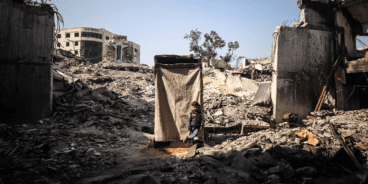
Statement on the Situation in Libya, February 2011
United Nations (UN) member states must uphold their 2005 commitment to the responsibility to protect (R2P) and take immediate action to protect the population of Libya from mass atrocities. The last several days have seen horrific violence perpetrated against civilians with reports suggesting that more than 200 people have been killed in the last three days alone. The death toll continues to rise and the risk of further bloodshed is high with Saif al-Islam Gaddafi, the son of the current leader Muammar Gaddafi, stating that if the protests do not stop there will be a “river of blood.” The Libyan government must stop this incendiary rhetoric and put an end to the deadly attacks being perpetrated against the population.
Recent reports of security forces opening fire on peaceful protesters and the use of military aircraft to attack demonstrators are unconscionable and, according to the UN Secretary General Ban Ki-Moon “if confirmed, would constitute a serious violation of international humanitarian law.” The UN High Commissioner for Human Rights, Navi Pillay, has called on the Libyan authorities to “immediately cease such illegal acts of violence” arguing that “widespread and systematic attacks against the civilian population may amount to crimes against humanity,” one of the four crimes that R2P seeks to banish forever.
The potential for continuing or even escalating atrocities is all too real with few signs that the Libyan government plans to act in accordance with its responsibility to protect. Muammar Gaddafi has made clear his readiness to commit atrocities in a bid to maintain power, stating in a speech today that those challenging the government “deserved to die” and that he will fight those protesting his regime “until the last drop of blood.” The conduct of security forces over the course of the past few days along with the reports of gunfire in the capital of Tripoli following the speech demonstrate the government’s willingness to carry out these threats. Also worrisome is the reported continued recruitment and use of foreign mercenaries, indicating a commitment to continued attacks on demonstrators even when portions of its own military have refused to participate.
A number of Libyan diplomats and military officers have defected, resigned their posts or repudiated the actions of their government, making clear that such crimes cannot continue. International actors must similarly not stand by and allow for the perpetration of mass atrocities. The responsibility to protect requires that where a government is manifestly failing to protect its population the UN Security Council must be prepared to take timely and decisive action to protect populations at risk. As the Libyan government clearly abdicated responsibility for protecting its population when it began shooting civilians in the street, member states must take steps to prevent the further commission of atrocities. Such steps may include:
- Calling on the government of Libya to uphold its responsibility to protect and halt the commission of atrocities;
- Establishing a no-fly zone over the entire country, pursuant to chapter VII of the UN charter, to prevent aerialattacks on civilians;
- Implementing a complete arms embargo prohibiting the sale, transfer or delivery of any weapons or militaryequipment to the government of Libya;
- Imposing targeted sanctions on key regime figures including Muammar Gaddafi, his family and others known to beinciting or ordering the commission of atrocities against civilians;
- Creating a commission of inquiry, with possible referral to the International Criminal Court, to investigate whether crimes against humanity have been committed by the Libyan government, security forces and foreign mercenaries.
UN member states and international organizations such as the African Union and the Arab League, which recently suspended Libya from its membership, must give their support to these measures as well. In addition, Libyan security forces should be encouraged to uphold international standards and exercise restraint. Member states should be prepared to offer safe haven to Libyan military or diplomatic personal that refuse to participate in the commission of crimes against civilians.
The evidence of crimes perpetrated against civilians is clear. There has been widespread condemnation of these horrific atrocities, but action must follow words. In keeping with the responsibility to protect, member states should use all available measures and leverage to end atrocities in Libya. The world is watching. Now is the time to act to save lives.
Related Content


Atrocity Alert No. 443: Sudan, Israel and the Occupied Palestinian Territory and United States Travel Ban
